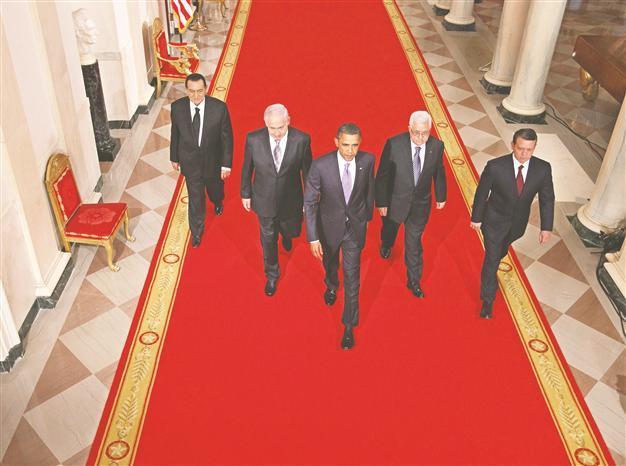Abbas, Netanyahu issue joint statement on peace
RAMALLAH

Israeli PM Netanyahu (L), US President Obama (C) and Palestinian President Abbas walk in White House in this 2010 photo. AA photo
Palestine and Israel issued a rare joint statement May 12, which said they were committed to peace after Prime Minister Benjamin Netanyahu dispatched an envoy to meet Palestinian President Mahmoud Abbas.The envoy carried a letter from Netanyahu replying to one he received last month from Abbas, in which the Palestinian leader stated his grievances over the collapse of peace talks in 2010 and laid out his parameters for a resumption of negotiations.
Details of Netanyahu’s letter were not released, but Israeli officials said last week that they did not expect him to accept a key Palestinian demand to halt all settlement building in the occupied territories before reopening any talks. Netanyahu’s office issued a joint statement with the Palestinians after envoy Yitzhak Molcho met Abbas in Ramallah.
“Israel and the Palestinian Authority are committed to achieving peace and the sides hope that the exchange of letters between President Abbas and Prime Minister Netanyahu will further this goal,” the statement said, according to Reuters.
Clinton calls Abbas
In a letter to Netanyahu, Abbas asked Israel to outline “as soon as possible” its positions on four key issues: the principle of a two-state solution based on pre-1967 lines, halting settlement activity, releasing all Palestinian prisoners and revoking all decisions that undermine bilateral agreements since 2000. Israel has said it wants negotiations without preconditions.
Few diplomats expect any breakthrough ahead of the United States presidential elections in November; however, the surprise formation of a national unity government in Israel last week has provided a slight flicker of hope. Netanyahu stunned the political establishment on May 8 by hooking up with the main opposition group, the centrist Kadima party, to form one of the biggest coalitions in Israeli history.
The head of Kadima, Shaul Mofaz, has long blamed Netanyahu for the failure of the peace talks and told reporters last week that entering new negotiations “was an iron condition for forming the unity government.” Before Abbas met Molcho, he received a call from U.S. Secretary of State Hillary Clinton to discuss regional issues, Abbas’s office said. Abbas also asked Clinton to intervene on behalf of the Palestinian hunger strikers in Israeli jails, Israel Radio reported.
















